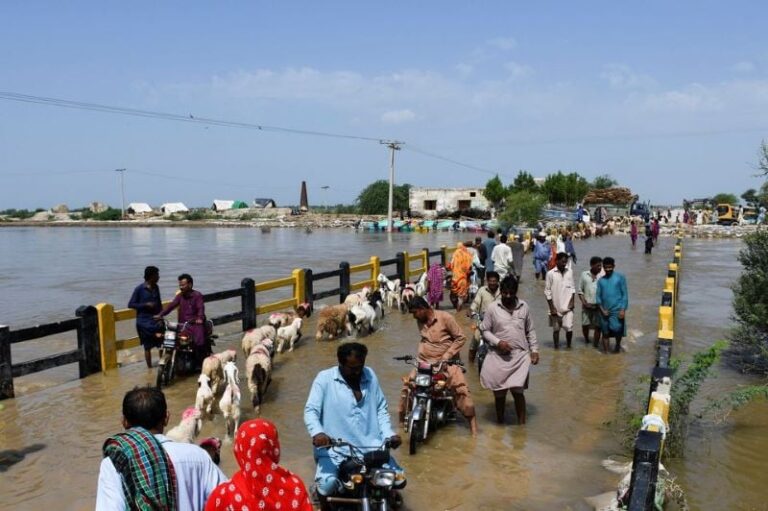Islamabad:
Pakistan has so far received $2.8 billion from international creditors out of the $11 billion pledged at the Geneva Conference for the flood-affected people, and only half of the amount received has been spent on flood victims, while the rest has been used to finance the budget.
Of the total disbursement of $2.8 billion, almost half came from non-flood-related loans, mainly in the form of oil loans and budgetary support. The Economy Ministry said the $2.8 billion disbursement was a major achievement, as 20 percent of the more than $8 billion pledged for various projects has been disbursed so far.
Read: “Children are the most affected by the 2022 floods”
Pakistan informed international donors on Tuesday that it has so far received only $2.8 billion of the $11 billion in aid it pledged about a year and a half ago.
According to a press statement, Minister for Economy Ahad Khan Cheema announced these figures at the fourth meeting of the International Partnership Support Group (IPSG). He said that out of the $11 billion pledged at the International Conference on Climate Resilience for Pakistan in Geneva, $2.8 billion has been disbursed till April 2024.
Pakistan came knocking on the door of the international community after the 2022 floods caused unprecedented damage. A UN-led damage and needs assessment report estimated the cost of rebuilding flood-hit areas at $16.3 billion, but the country was pledged $11 billion, but that was not a new commitment. Most of the lenders pointed to their existing loan pipeline to Pakistan as their commitment to flood victims.
The Support Group meeting marked nearly two years since the devastating 2022 floods and aimed to review the progress made in flood recovery and recalibrate efforts towards a resilient Pakistan.
The amount actually spent on the ground is tiny compared to the massive needs, and $1.35 billion of the $2.8 billion was actually spent for non-flood-fighting purposes. Then-Finance Minister Ishaq Dar said that almost 90 percent of the money pledged by the international community at Geneva for flood-hit Pakistan was project loans to be disbursed over the next three years.
The largest loan for the project was provided by the Islamic Development Bank at $4.2 billion, but so far the IDB has disbursed $65 million in project financing and $200 million for the oil facilities.
The Asian Development Bank had pledged $500 million in assistance, but only $98 million has been disbursed so far by regional financial institutions, and the Asian Infrastructure Investment Bank had pledged $1 billion, but has so far provided $250 million in non-flood budget support.
The World Bank has committed $2 billion in loans and has disbursed nearly $1.1 billion so far, the highest amount of any lending agency. The World Bank’s role is commendable as it is the only international creditor that has fast-tracked and approved flood-related schemes being implemented in the two worst-hit provinces, Balochistan and Sindh. The World Bank country office has also established a transparent mechanism to track the development of the housing sector in Sindh, where lending agencies are providing funds for housing reconstruction.
The Saudi Fund for Development has committed $1 billion in loans, in the form of oil loans, as part of the $2.8 billion disbursement.
The Paris Club and the European Union have also spent $65 million against their Geneva commitments, mostly in the form of grants, while the United States has spent $61 million in grants.
Foreign inflows into Pakistan have slowed due to the deteriorating economic situation, despite it being under the umbrella of the International Monetary Fund. The government aims to raise a total of $6.1 billion in bilateral and multilateral loans in the next fiscal year, but so far the amount has not exceeded $5.4 billion.
Read: WHO warns of ‘second disaster’ in flood-hit Pakistan
The Economy Ministry said the Support Group meeting was attended by representatives of bilateral and multilateral development partners, including ambassadors from Azerbaijan, Sweden, Kazakhstan, Norway and Australia, as well as diplomats from Germany, China, the UAE, South Korea, the United States, Qatar, Turkey, the Netherlands, Russia, Japan, France and Switzerland, as well as officials from the Canadian and British High Commissions.
Representatives from various international organisations, including UNDP, World Bank, ADB, IMF, AIIB, UNRC, EU, KfW, UNICEF, IsDB, WFP, AICS and USAID, were also in attendance.

